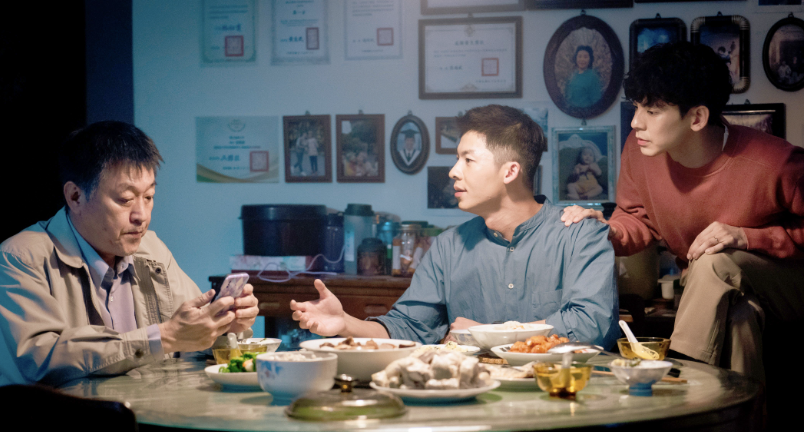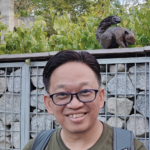TLDR: Marry My Dead Body. With increased exposure and interactions, we can learn to reduce our fear and overcome our biases and prejudices towards people who are different from us. The power of love, compassion, and forgiveness is not to be underestimated; it can help us overcome our challenges and increase the happiness of ourselves and others.
Marry my dead body

Cr: Netflix
Marry My Dead Body is a funny Taiwanese LGBTQ-themed movie that weaves in themes of love, compassion, and forgiveness. Some minor spoilers will be shared here, please proceed with caution.
In brief, the movie is about a straight homophobic and ghostphobic male cop, Ming Han, who was compelled to marry a male gay ghost, Mao Mao, in a traditional ghost wedding, to avoid a string of bad luck.
Through a series of hilarious interactions between the cop and the ghost, we see the relationship transform from intense animosity to tolerance, acceptance, and love. Below are three Dhammic lessons I glimpsed when watching the movie!
Cultivating Love for Difficult People:
What do you think when I mention Love? You are probably thinking of your past unrequited love aka crush, or if you are lucky, romantic love, yet the word love encompasses more than just romantic love. Psychologist Robert Sternberg proposes the Triangular Theory of Love, which consists of 3 components of love that includes 1) commitment, 2) passion, and 3) intimacy.
Love takes on diverse forms, like a tapestry woven with romantic love, companionate love, friendship love, and consummate love.
Romantic love ignites quickly with passion and intimacy but can fizzle without lasting commitment.
In enduring relationships, passion may dim, but companionate love emerges, where commitment and intimacy persist, transforming partners into best friends.
Friendship love is marked by heartfelt intimacy, yet it lacks the fiery passion and enduring commitment found in romantic relationships.
The pinnacle is consummate love in Sternberg’s theory – the trio of commitment, passion, and intimacy, a love that endures through time, keeping the flames of passion and intimacy alive.
Love conquers all may be a cliché that we often hear, but does it ring true in Buddhism? What does the Buddha have to say about love? The Buddha teaches and encourages us to cultivate love – specifically, in the form of Mettā or Lovingkindness.
Metta & the gay ghost

Cr: Netlfix
In the practice of Mettā, besides finding it hard to extend lovingkindness for oneself, the other group of people we find challenging to practice with would be the “Difficult People” in our lives.
Similarly, in the movie, the homophobic cop has a hard time extending love, care, and concern to the gay ghost. The cop felt that he was tricked into the arranged marriage, plus, he embraces a more macho, no-nonsense approach to life, whereas the ghost appears to be more effeminate, and playful to his liking.
Nevertheless, after an extended period of interaction and understanding the challenges the ghost has to endure, he slowly opens up to the ghost. He is able to extend goodwill towards his adversary – the ghost.
I recall in one of Ajahn Brahm’s talks, he shared a technique on how to extend lovingkindness to a difficult person in our life. Ajahn Brahm encourages us to look at a person’s face and see if we can extend Lovingkindness to the person’s eyes, nose, ear, mouth, or other features of the face that are acceptable enough for us to extend our love towards.
Another cliché comes to mind, “How do you eat an elephant? One bite at a time!” The point here is to break the hard and challenging part of extending Mettā towards our “Enemies” into small bite-sized forms, and you may find the Mettā flows freely towards them!
Compassion for Others’ Suffering:
Suffering is inevitable in our daily lives, and when we are overwhelmed with our pain and losses, we may find it hard to extend compassion to others around us.
However, to alleviate our pain and suffering, sometimes, it helps to turn outward to others around us, and see how we can help those in need. In psychology, this technique would be called downward social comparison, whereby instead of comparing ourselves to others who are doing better than us, we would compare ourselves to those who are worse off than us.
By doing this, we can learn to 1) be grateful for the things going well for us; and 2) extend our compassion towards those in need.
When Ming Han, the cop, saw that Mao Mao was dealing with unrequited one-sided love with his boyfriend, Ming Han realized that despite having a different sexual orientation from Mao Mao, the desire to love and be loved is natural and universal.
This was observed when we saw that Mao Mao wanted to get married to his boyfriend, following the legalization of gay marriage in Taiwan. Mao Mao wanted to gain the legal recognition of marriage like other straight couples.
Finding common ground or values makes it easier to relate and connect to others in our lives. These tiny glimpses into the life of another allow one’s compassion to come forth easily.
For myself, when I am frustrated with my interactions with difficult people, I remind myself that they too desire happiness. Of course, our approach to achieving happiness may differ, but that does not mean that I have the right to stop them from pursuing their happiness.
HH Dalai Lama shares that everyone wishes to pursue happiness and avoid suffering. However, since we cannot fully avoid suffering as unenlightened beings, we can have a compassionate heart to buffer ourselves against suffering.
Compassion helps to buffer against suffering in two ways, 1) by helping to neutralize and reduce the impact of negative thoughts that arise in our mind, and 2) by providing the inner-confidence to endure and overcome challenges that come up in our life, so both our heart and mind is steady and collected.
HH Dalai Lama further elaborates that compassion causes our brain to function better and brings inner strength, which serves as a source of happiness. For a person who has to deal with not only his own suffering but also the suffering of the Tibetan people, the Dalai Lama has a higher level of acceptance and compassion towards the suffering of others than I do.
Forgiveness is Always Possible:
I recalled in the Dec 2022 meditation retreat that I attended with Ajahn Brahm, I was having a challenging time practising. I tried my usual array of Mindfulness, Lovingkindness, and Compassion meditation, yet they all failed to calm my agitated mind towards the difficult person in my workplace.
Then, I remembered the Forgiveness practice that I learned with my Buddhist lay teacher – Jeff Oliver, and I downloaded his e-book – “Forgiveness of Everyone” to dive deep into the practice and I found that Forgiveness worked! I had immense gratitude to the retreat participant who asked a question about Forgiveness and to Ajahn Brahm for eloquently elaborating on the Forgiveness practice, which planted the seed for me to give Forgiveness practice another try during the retreat.
The power of forgiveness comes alive during the movie. It made me ponder, that sometimes, the key to letting go of a difficult situation or person in our life is by forgiving them.
In the movie, a poignant part is where the ghost’s father seeks forgiveness for his dismissive behaviour toward his son’s decision to marry his boyfriend.
The act of seeking forgiveness, despite not being able to interact with Mao Mao (the ghost) directly, helps to absolve the guilt of the father, and also for Mao Mao who was able to hear the love flowing from his father helped him to be absolved from his worldly attachment and be set free.

Cr: Netflix
As viewers, through the backstory, we actually see that there was a big misunderstanding between the father and the ghost, resulting in anger and frustration in their already tense relationship.
Similarly in life, we may rightfully be upset with our friends and loved ones over their seemingly “wrong” behaviour, but we may be clouded with our own thoughts and fail to see the true reason why they may behave the way they did.
Hence, open communication and forgiveness may help smoothen our social relationships before they deteriorate. We do not want to wait until the inevitable (Death) happens, and we cannot mend our relationships.
Conclusion
In conclusion, if you are looking for a light-hearted movie to ease your mind off your daily grind yet want to gain some wisdom from watching movies, check out Marry My Dead Body.
Besides having a good laugh, you may discover additional nuggets of wisdom to better navigate your relationships in life and gain a better understanding and compassion towards LGBTQ+ individuals. Let us strive to help ourselves, and our fellow beings lead a happier and more compassionate life, in whatever small ways we can.
Wise Steps:
- To increase our tolerance towards people of different values and experiences, try to read a short article or a book, or even talk to someone who has that lived-in experience, and see how your views and attitudes may change after a chat. Or you can try to practice sending Mettā first, before engaging with them.
- Try to imagine yourself in a challenging situation in life who desires help and support from others. Similarly, others are also seeking relief from suffering. What small ways can we help those in need? Donating $1 or $2 to the tissue seller by the street is my small way of extending my compassion to those in need, how about you?
- In dealing with difficult people in our lives, we may not be able, nor do we wish to seek direct communication with the other party. Still, we can use a tip from psychological research – write a letter to the other person, to express our views and forgive them. This may be the release you need for self-healing.
- For those who self-identified as LGBTQ+ Buddhist or allies, you can check out Rainbodhi Singapore community, explore the website here or join the Telegram group for event updates here.


